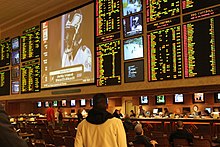
Back Спортно залагане Bulgarian सट्टा BH Aposta esportiva Catalan Sportsvæddemål Danish Sportwette German Αθλητικό στοίχημα Greek Apuesta deportiva Spanish شرطبندی ورزشی FA Urheiluvedonlyönti Finnish Pari sportif French
This article has multiple issues. Please help improve it or discuss these issues on the talk page. (Learn how and when to remove these messages)
|

Sports betting is the activity of predicting sports results and placing a wager on the outcome.
Sports bettors place their wagers either legally, through a bookmaker/sportsbook, or illegally through privately run enterprises referred to as "bookies". The term "book" is a reference to the books used by wage brokers to track wagers, payouts, and debts. Many legal sportsbooks are found online, operated over the Internet from jurisdictions separate from the clients they serve, usually to get around various gambling laws (such as the Unlawful Internet Gambling Enforcement Act of 2006 in the United States) in select markets, such as Las Vegas, or on gambling cruises through self-serve kiosks.[1] There are different types of legalized sports betting now such as game betting, parlays props and future bets. They take bets "up-front", meaning the bettor must pay the sportsbook before placing the bet. Due to the nature of their business, illegal bookies can operate anywhere but only require money from losing bettors and do not require the wagered money up front, creating the possibility of debt to the bookie from the bettor. This creates a number of other criminal elements, thus furthering their illegality.
There have been a number of sports betting scandals, affecting the integrity of sports events through various acts including point shaving (players affecting the score by missing shots), spot-fixing (a player action is fixed), bad calls from officials at key moments, and overall match-fixing (the overall result of the event is fixed). Examples include the 1919 World Series, the alleged (and later admitted) illegal gambling of former baseball player Pete Rose, and former NBA referee Tim Donaghy.
- ^ Preciado, Dan (February 28, 2023). "States Where Sports Betting Is Legal". Forbes Betting. Retrieved May 2, 2023.